Balancing Development with Maintenance of the Desert Ecosystem: 29 Palms Town Hall, Part 2 of 3
A local economy versus a tourist economy, preserving nature in the wake of development, and the desert capitalist rat-race.

Note: This is the second of three articles in which Desert Trumpet writers recap the discussions held on Saturday, June 29, during Envisioning Our City’s Future: A Twentynine Palms Town Hall, hosted by the Desert Trumpet.
On Saturday, June 29, more than 50 residents attended the town hall held at the community center in Freedom Plaza. The Town Hall was hosted by the Desert Trumpet and supported by the Desert Trail. The open discussion among residents was facilitated by moderator and Desert Trumpet Editor-in-Chief Cindy Bernard and prompted by our guests: Chris Clarke, Host, 90 Miles from Needles, the Desert Protection Podcast, Paul Razo, Business owner, Member, Public Art Advisory Committee (PAAC) and Carrie Williams, Co-owner, Jeanine Beauty Supply, CEO Women of Color Global 29.
Wide-ranging conversations between the panelists and the audience included issues of concern to Twentynine Palms, such as education and opportunities for young people, housing, balancing tourism and livable conditions for residents, and support for local businesses. It was a lively get-together, and we are grateful to everyone who took part.

Twentynine Palms resident, business co-owner, and Public Arts Advisory Committee (PAAC) member Paul Razo spoke about balancing development with maintenance of the desert’s ecosystem. Razo, who was raised here in San Bernardino County, compared his unincorporated hometown of Bloomington, CA, with Twentynine Palms as both regions include large areas of rural living zoning.
Sandwiched between a cluster of freeways, with Fontana to its west, the Riverside County line to its south, and a century-old Union Pacific rail line cutting through it, the unincorporated town of Bloomington has faced encroachment from municipal entities, corporate monopolies, and developers since the late 1800s.1
Bloomington reported a population of approximately 25,000 in the 2020 census. Comparatively, the town of Twentynine Palms reported a population of about 27,040 in 2020, which includes an ephemeral Marine base population that frequently fluctuates based on U.S. military operations. In his opening discussion, Razo reflected on his childhood in Bloomington, as warehouses and Amazon fulfillment distribution centers began infiltrating his hometown.
“They'll say, ‘Look, we'll pay for the filters on the air conditioner. Don't go outside, but we'll pay for the filters on the air conditioner. So at least you can breathe indoors, it'll be fine,’” said Razo, speaking of pollution generated by diesel engines that enter and exit these warehouse corridors on 24-hour basis.
Disenfranchised among this growth are families with multi-generational roots in the area, including Razo’s, whose grandfather settled in Bloomington after returning from the Vietnam War. The area was once popular for its ranches, chicken farms, and a robust blue collar population. Today, those ranches have since dwindled as homes are taken by annexation, eminent domain, and lost in legal limbo as warehouse projects backed by powerful corporate entities with deep legal pockets are green-lit at the county level.
Razo also mentioned the development of a proposed solar farm in City Council District 2 and the newly endangered status of the desert tortoise.
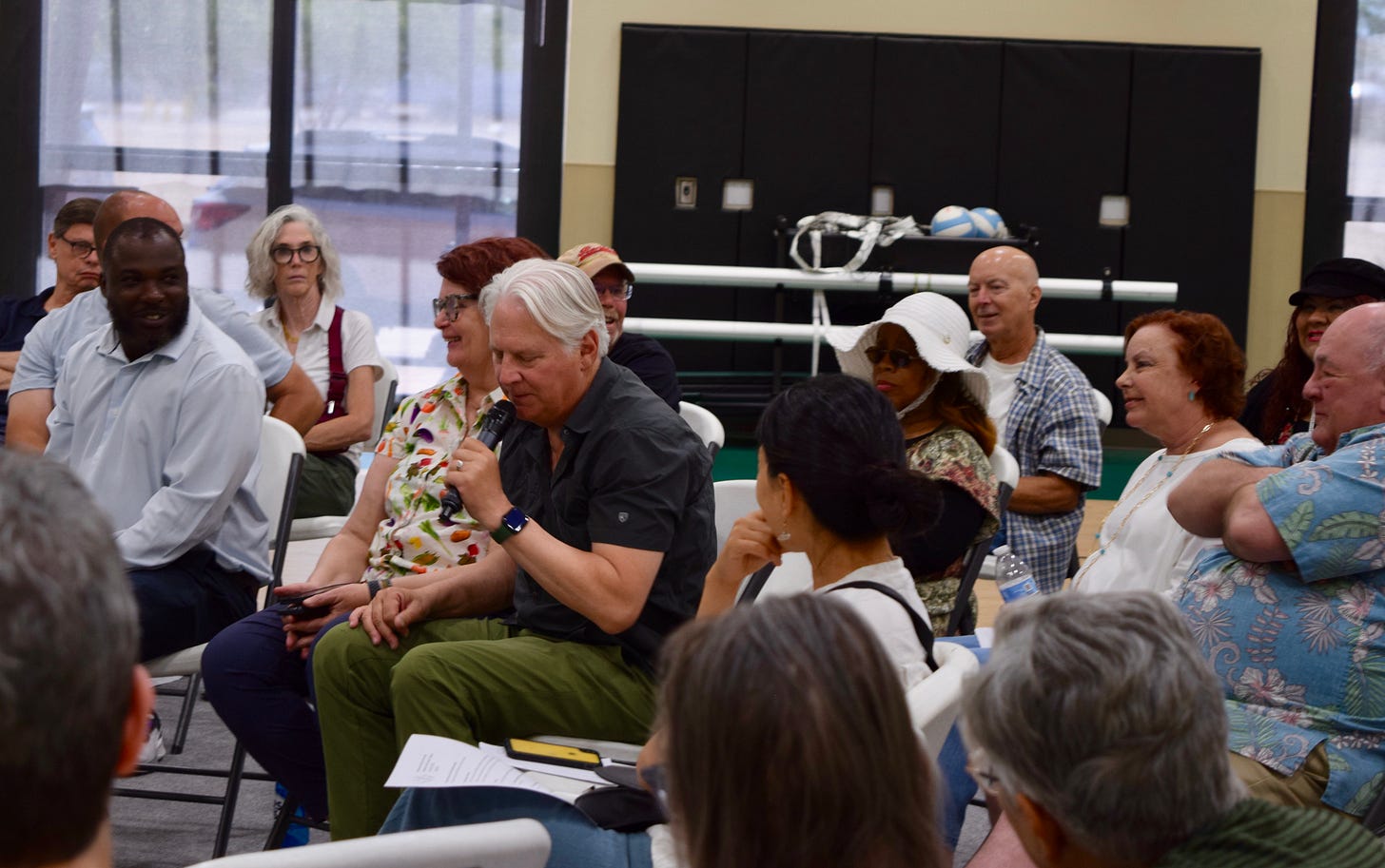
With environmental preservation in mind, Indian Cove resident John Talley-Jones kicked off audience discussion by highlighting the City’s lack of proactive policy regarding development, suggesting the City retract from its defensive approach and instead take action:
“What I think I'm seeing is that the city tends to be pretty reactive. An entity will come into the city and identify a project that they want to plop down somewhere and there's very little regard to the ecosystem when this sort of thing happens, which is very worrisome.”
Desert preservationist and guest speaker Chris Clarke piggybacked off Talley-Jones by highlighting the various mining prospects people have continuously sought in the desert the last two centuries, from gold and silver in the 1800s, to borax and salt in the 1900s, to lithium and secluded vacation time in the present day. Juxtaposing in-demand desert minerals and a sensitive desert environment, on top of competing vacation rentals and a national park that brings more than three million tourists annually, Clarke summarized the competing factors at play here in the Mojave desert.
“The desert has historically been a place that people mine. People from outside mine for wealth. You know, it was gold and borax and tin and lead and all that kind of stuff before. Now it's vacation time and sunlight and wind and lithium. And that's a mindset that is increasingly unpopular among people that live in the desert and more and more of us live here. Not because we have a prospect somewhere although a lot of us do. But because the quality of life is possible here and it's really fantastic and unmatched anywhere else in the country.”
Discussion pivoted to solar farms and desert tortoises, with Clarke mentioning that with just a short jaunt behind the Stater Bros commercial development, one can find wild desert tortoises.
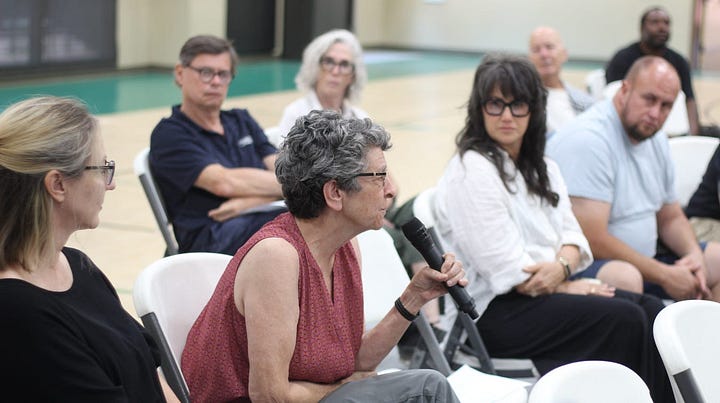
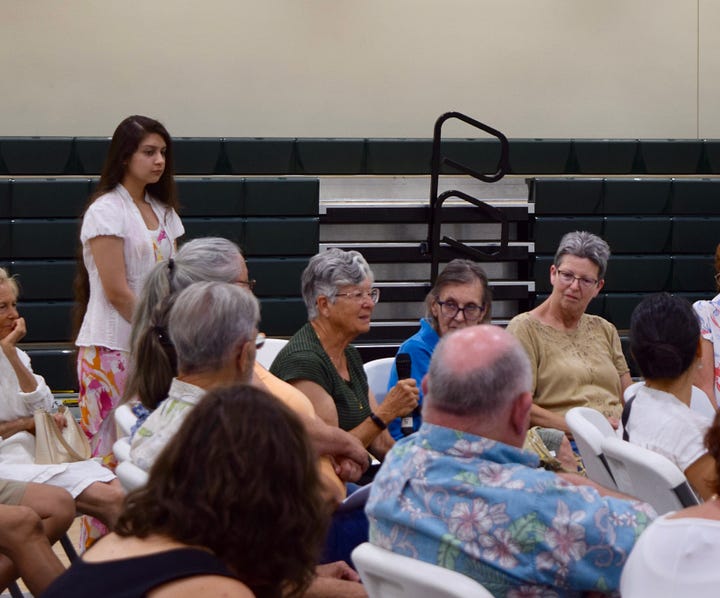
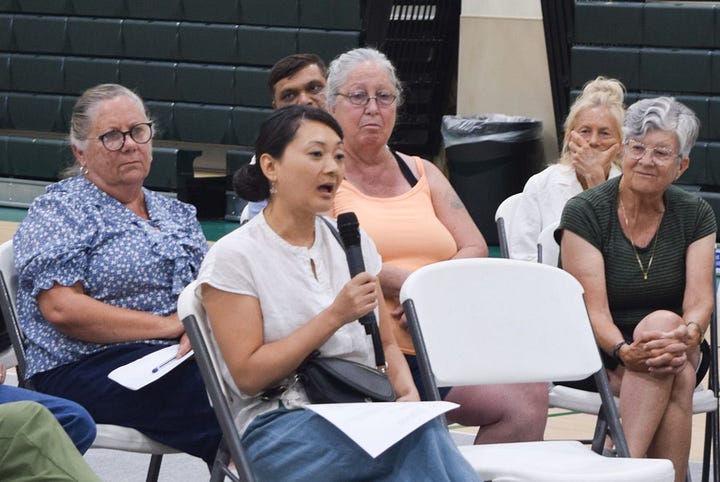
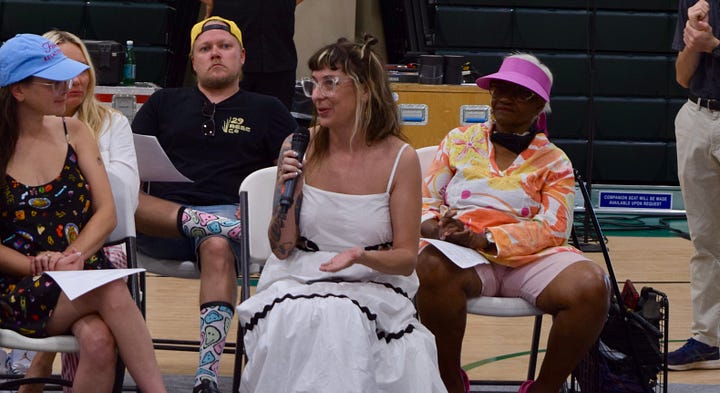
Janet Kodesh, owner of Desert Ace Hardware and proud TPHS alumna (Class of ‘73), said she left the area for awhile but returned once she inherited the hardware store as she saw it as a crucial community fixture.
“When I inherited the store, the question was, do we keep it going? Or not? Keep it going or not. And the thing about a hardware store is, it's an important part of the ecosystem. It supports…it's obvious (lots of nodding heads). People get it.”
Speaking of the numerous dollar stores in town, Kodesh echoed sentiments expressed by Talley-Jones — “It gets back to that idea of being proactive instead of reactive.”
The question of essential business was then brought up, with Razo asking where local families go when their children need new clothes. Resident Mary Kay Sherry, resident since 1971, spoke fondly of Twentynine Palms businesses in the past that have since been shuttered.
“I'll tell these young [Marine] spouses when they come here, when I first came to Twentynine Palms, you didn't have to leave town for anything. You had everything here. I used to work at the little hospital, which is now a church on Adobe Road, as a new nurse. So we had medical care, we had Benton Brothers, we had shoe stores, we had dress stores, we had Paint Pot. I mean, if I had a list of all the things that we had – we never had to leave town.”
A palpable shift in mood was felt throughout the room when longtime resident Sherry brought up the desert tortoises. “They've been here longer than we've been here. And they'll be here long after we leave. We have stewardship — we have to take care of that. And we can't be bullied into accepting a lot of the things that we're accepting now,” stated Sherry as she held back tears.
Acknowledging the emotion behind this discussion topic, Lori Cosgriff, who has called Twentynine Palms home since 1974, emphasized the need for the city to facilitate an environment that its youth would want to invest in, applauding locals who grew up here and have decided to operate businesses here.
With the Desert Trumpet Town Hall forum taking place on a 106 degree day in June, a common discussion theme among business operators was heat, tourism, and the down season. Former Copper Mountain College District candidate and local yoga instructor Supinda Siri, who instructs both tourists and local clientele at the 29 Palms Inn, emphasized that local residents form the backbone of business out here, especially during the summer.
“I hope that the city – the citizens and business owners – everybody keeps that in mind that we're still here when the tourists leave. So if businesses can be conscious of the fact that the people that are going to keep coming are the folks that live here. Those are the ones that support me as in what I do, so thank you.”
Owner of retail storefront Scorpion Lollipop and Downtown Business Association Secretary Sara Lyons suggested that the city and locals could provide more support to encourage businesses to invest here, emphasizing her wish for local shops such as those at Corner 62 to be buttressed even more by locals than tourists.
Echoing Siri and Lyons, DBA President and Co-Owner of GRND SQRL Mike Usher highlighted the importance of the spending leverage locals maintain over tourists, particularly during the tourist down season, suggesting more businesses could operate here successfully if Amazon dollars were not being spent.
“The thing that I have learned, or at least in my personal experience, the locals keep your bills paid for the entire year. And when the tourists are here, that's when you make your profits….I think that finding that balance between having enough businesses to provide what the community wants and needs, and also having that same buy-in from the community that we are going to support these things and be conscious of these little ways that we can be spending our dollars in local businesses versus Amazon or these other things.”

Resident Kimberly Zzyzx of the Institute of Inquiry proposed that the City of Twentynine Palms has a possible staffing issue.
“One of the first lines of defense our community has against inappropriate development are the folks at the building and the land use departments and I've seen some minimal growth in their staff in the time since I moved here in 2016. But we all as business owners know what it's like to have 55 different hats… And so I wonder what it would look like to put more money into the staff of the city, if that's something we even can afford, to have more personnel who are also trained to be looking at development with that kind of an eye.”
Cindy Bernard mentioned that with the upcoming November City Council election comes two appointed Planning Commission seats and that residents will have an opportunity to make their voices heard. Councilmember Octavious Scott then concluded the discussion topic with a bold message to developers:
“We really need to be mindful about developers coming into the city and dictating what they want to do. The people in this room dictate what we want to do in the city,” stated Scott, acknowledging the voting power local residents maintain at the ballot booth and when choosing their local elected officials.
Stay tuned for part 3, with discussion topics of inclusivity, accessibility, and members of the Twentynine Palms Youth Council sharing their thoughts on the future of Twentynine Palms.
Want more? Read the complete transcript of Part Two: Balancing Development With Maintenance of The Desert Ecosystem.
Feel free to share this article.
Leave your thoughts in the comments below. Please note that we do not allow anonymous comments. Please be sure your first and last name is on your profile prior to commenting. Anonymous comments will be deleted.
Many communities in the Morongo Basin are economically disadvantaged, so our coverage will always be free. However, if you have the means to support our work, we always appreciate upgrades to a paid subscription. Your upgrade helps keep subscriptions free for those who cannot afford to donate.
Note that donations in excess of $100 are tax deductible to the extent allowed by law, and your subscription/donation will be listed as AHA Projects, the name of our fiscal receiver, on your statement. Donations over $100 can be made via the Aha Paypal.
Union Pacific Railroad and Amazon Corporation maintain business operations in Bloomington.


Being pro-active makes a whole lot of sense. Encouraging businesses other than tourism, which is cyclical, should be part of the package - but not just any business.